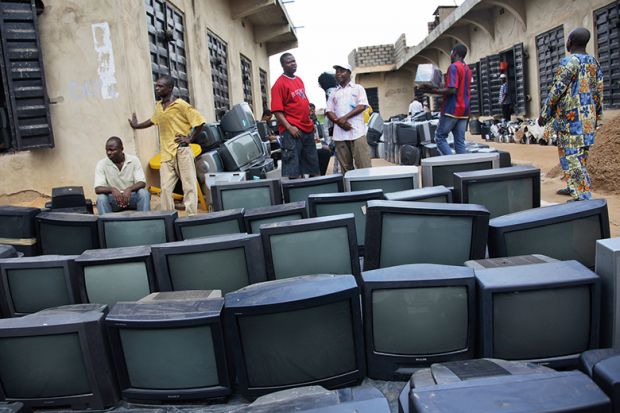As vice-chancellor of the University of Rwanda, Phil Cotton often has to say a firm “no” to well-meaning potential benefactors.
“Lots of academic colleagues want to send me stuff that they don’t need – old textbooks or out-of-date medical equipment that will last only a short time,” explained Professor Cotton about turning down the offers from leading universities in the West. “They think these items aren’t good enough for their students, but they are good enough for mine,” added the London-born former GP, who has led Rwanda’s only state university since 2015, taking over two years after it was formed in 2013 by the merger of 14 public higher education institutions.
Accepting these gifts can end up costing the university money as electrical equipment often has to be decommissioned and disposed of at considerable expense when it breaks down, added Professor Cotton, who joined Rwanda on secondment from the University of Glasgow in 2013 to set up and lead its medical school. “I don’t blame people as I used to do it myself – I was forever rounding up things to send to Africa,” he recalled of his previous life at the ancient Scottish university.
However, the challenges of running a new university with 10 campuses and 30,000 students could hardly be more different to those faced by Professor Cotton at Glasgow’s medical school, where he is still professor of learning and teaching. “I spend about an hour and a half each day writing to staff and students to congratulate them on various achievements – it might seem a lot but it’s part of the culture change we need here,” said Professor Cotton, who has also introduced financial rewards to incentivise excellence.
“Every time someone publishes a paper they get $1,000 [£775] for their research account,” explained Professor Cotton, who said that this is more than the $800 that senior professors will take home each month in Rwanda. Some 177 academics are also being supported to take a PhD, since less than 25 per cent of the university’s 1,400 academics currently have a doctorate, he added. “The problem is that as soon as they graduate, they are mopped up by private providers,” admitted Professor Cotton.
Breaking down the highly hierarchical relationship between staff and students is another ongoing task, Professor Cotton explained. In university meetings, the simple act of moving senior managers “out of their exalted thrones flanking the vice-chancellor and putting the students’ guild [representative] in there” was seen as a radical move, he said.
Despite frustrations with some of Rwanda’s more archaic university regulation (quality inspectors take a keen interest in the number of library books and lecture theatre seats), Professor Cotton said he remains a strong supporter of Rwandan president Paul Kagame, especially his focus on improving educational opportunities in the East African country, still mainly known for the 100-day genocide in 1994 in which up to 1 million Tutsis were massacred.
“There is a vision of national transformation through higher education that is just mind-blowing because it involves a complete obsession with helping every single young person in Rwanda,” said Professor Cotton, who credits President Kagame’s “energy for moving the country forward”.
With primary school attendance at nearly 100 per cent – the highest rate in Africa – attention is now turning to how this country of 12.5 million people can improve secondary and tertiary education. Rwanda’s flagship university is not only a crucial part of the country’s ambitions to become a developed knowledge economy, but it is playing its part to ensure that no catastrophic rift between ethnic groups ever happens again, said Professor Cotton, who pointed to the huge amount of voluntary work done by students. “On the last Sunday of every month, everyone does community work, such as litter picking, together – it’s very important for community cohesion and it’s also why Kigali is one of the tidiest cities in the world,” added Professor Cotton.
The university’s steady improvement in its first five years is part of a wider effort to change the “oppression narrative” that has hung over Rwanda for many years, said Professor Cotton, who speaks glowingly about the dynamism and vitality found at his institution. The disbelief in some quarters when Rwanda’s tourist board paid millions of pounds to put its name on the sleeves of Arsenal football shirts – evident from Radio 4 Today programme host John Humphrys’ dismissive interview with the country’s development chief on the issue in May – suggests that this perception of Rwanda will be hard to shake, even for academics, said Professor Cotton.
Instead of donating laboratory cast-offs, academics seeking to help should treat the Rwandan university as more of a partner by engaging and listening, he said. “If you have a new piece of management software, then you could give us associate college status as you trial it,” he suggested. “Or you could set up a joint master’s course with us, offering local tuition fee rates to Rwandan students. From PhD waivers [to] student grants, there is a huge amount that could be done by universities.”
后记
Print headline: Please, spare us your cast-offs, v-c in Africa tells academy in the West




